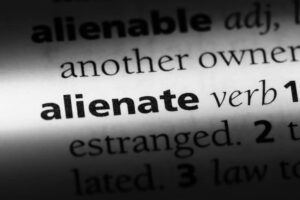
Is Alienation of Affection still a thing in North Carolina?
Alienation of Affection in NC
Messing with a marital relationship is a big deal. In fact, it can have substantial consequences.
While it may seem to some an outdated law, one would be wise to understand this: Alienation of Affection is alive and well in North Carolina.
For that matter, so is Criminal Conversation.
People sometimes ignore claims of Alienation of Affection, and Criminal Conversation; in fact, on more than one occasion we’ve seen responses that dare, if not invite, litigation. We think that’s a tremendous mistake. However you may feel about the AACC laws in North Carolina, people do sue for interfering with marriages – Bill Powers, Charlotte Family Law Attorney
If you are somehow involved in an AACC claim, (Alienation of Affection / Criminal Conversation) we hope this blog post helps provide some of the basics behind the law.
Thereafter, if you have questions about bringing a possible claim (or defending a lawsuit alleging interfering with a marriage), the attorneys at the Powers Law Firm are available for consultation.
What is Alienation of Affection in North Carolina?
Under what lawyers may call the Common Law, it has traditionally been possible for someone to sue their spouse’s lover if they can prove that the affair led to the breakdown of the marriage.
Alienation of Affections in NC
That is, someone interfered with the marriage, thus resulting in Alienation of Affection. People tend to have a lot of questions about AACC claims in North Carolina, such as:
- Is this law still relevant in today’s society?
- Or is it a thing of the past?
- Can you sue someone in North Carolina for Alienation of Affections?
- How much are “damages?”
- What is the difference between Alienation of Affection and Criminal Conversation?
The NC Alienation of Affection Law
Chapter 52 of the North Carolina General Statutes sets forth the law on Alienation of Affections and Criminal Conversation.
In order to prove a case for alienation of affections, the plaintiff must show that:
There was a valid marriage between the plaintiff and the spouse;
Genuine affection or love existed between them;
That affection or love was alienated or destroyed; AND
The wrongful and malicious acts of the defendant caused the alienation of affection or love.
Actions that may be considered “wrongful” include adultery, criminal conversation, and/or any other deliberate interference with the marital relationship.
If you’ve received a letter from a lawyer, threatening litigation for interfering with a marraige, don’t fire off an angry response or speak about what happened. Lawyer up – Bill Powers, Family Law Attorney in Charlotte
It is important to understand, while more commonly related to romantic relationships and/or sexual encounters with a cheating spouse, people other than “lovers” can be held liable for Alienation of Affection.
For example, in North Carolina, an interfering “in-law” can be technically subject to civil claims under the NC affection law.
What are the possible damages for an Alienation of Affections claim in NC?
In North Carolina, the general rule is that AACC plaintiffs can recover both economic and non-economic  damages for interfering with a loving marriage.
damages for interfering with a loving marriage.
Economic damages are those which compensate a plaintiff for monetary losses related to the interference with the marriage. These may include:
- Loss of earnings or earning capacity
- Medical expenses
- Counseling/therapy expenses
- Other financial harms suffered as a result of the alienation
Noneconomic damages are those which cannot be calculated in terms of dollars and cents. Instead, they seek to compensate a plaintiff for more intangible injuries, such as:
- Mental anguish
- Humiliation
- Anxiety – Emotional Distress
- Loss of companionship
- Loss of love and affection
- Interference with an exclusive, marital sexual relationship
In some cases, there also can be an award punitive damages.
Punitive damages are designed to punish a defendant for particularly egregious conduct and to serve as a deterrent for others who might be tempted to engage in similar behavior to the defendant’s conduct.
What is the difference between Alienation of Affections and Criminal Conversation?
Criminal conversation is very similar to alienation of affections.
The main difference is that criminal conversation focuses on sexual intercourse between the spouse and the third party, while an affection lawsuit can encompass any wrongful or malicious interference with the marriage, whether sexual or not.
Criminal Conversation in North Carolina
Both claims for wrongful conduct were created at a time when North Carolina (and most other states) did not allow divorce for any reason other than adultery by a cheating spouse.
As a result, an affection claim was a legal recourse available to spouses who had been wronged by a cheating spouse and his or her lover.
With the advent of no-fault divorce, a criminal conversation/affection claim has become much less common. Only a few states still recognize what lawyers may refer to as “heart balm” affection cases.
However, Alienation of Affection lawsuits remain viable in North Carolina and can be brought in certain circumstances.
If you think you may have a claim for alienation of affections or criminal conversation, you should contact an experienced family law attorney to discuss your case.
Do all Divorce Lawyers handle Alienation of Affection cases?
While such a claim for Alienation of affection remains valid under the NC law, few family law/divorce lawyers in North Carolina are willing to serve as legal counsel in a civil lawsuit.
Need a Charlotte Divorce Lawyer?
There are various reasons for that.
Some divorce lawyers personally disagree with the cause of action. Other attorneys do not have jury trial  experience.
experience.
Alienation of affection lawsuits are often filed in Superior Court in North Carolina. Divorces are handled in District Court in NC, by a District Court “family court” judge.
The cause of action in an affection lawsuit is in some ways fundamentally different than issues involving Equitable Distribution, child custody, and support – Bill Powers, Charlotte Divorce Lawyer
Our law firm helps people with Alienation of Affections cases, both in bringing causes of action and defending them.
We do not limit ourselves to territorial restrictions, meaning that while a Charlotte-based family law firm, we will travel in appropriate circumstances to help people.
In fact, given the somewhat sensitive nature of such causes of action, some clients prefer working with an attorney or law firm from another judicial district or jurisdiction.
Our law license says ‘North Carolina’ on it and isn’t limited to Mecklenburg County. In fact, when it comes to AACC claims, historically we’ve served more people from surrounding counties in smaller towns. When we think we can help people, we will travel – Bill Powers, Alienation of Affections Lawyer
Are sexual relations required?
An Alienation of Affection lawsuit does not require proof of sexual intercourse or sexual conduct. Similarly, a divorce is not required.
The plaintiff need only prove their spouse’s affections were materially affected due to the adulterous spouse’s lover and his or her actions.
Affection lawsuits may use proof of such behavior to prove why or how a spouse’s affections were materially harmed.
Learn More